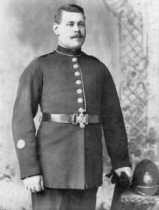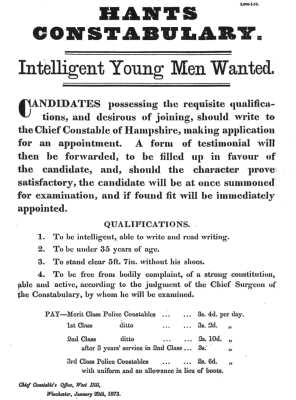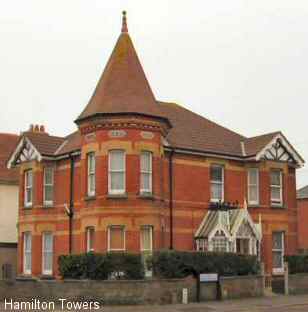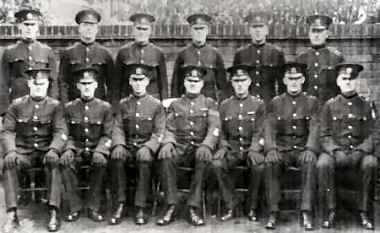|
A Policeman's Lot
More than a century of policing Winton
 In
1890 the Winton Parish magazine lamented "we are, it is to
be supposed, so orderly that we only require, or at least only
get, the services of one resident policeman". In
1890 the Winton Parish magazine lamented "we are, it is to
be supposed, so orderly that we only require, or at least only
get, the services of one resident policeman".
Since Hampshire Constabulary started police cover
in the 1860's there had been only one constable to patrol the
area - and he was based in Moordown.
His job was not an easy one. He was on duty seven
days a week, had virtually no holiday and was paid around £1
a week.
It wasn't until 1894 that PC's were granted seven
days holiday a year. Higher ranking officers got ten. And it was
another twenty years before the constables were entitled to a
day off each week. Even that had to be phased in over a four year
period - initially with a day off every fortnight.
Hard times
 Those
were the days when justice was tough. If he arrested a beggar,
the constable could expect to see the unfortunate person being
jailed for fourteen days. Those
were the days when justice was tough. If he arrested a beggar,
the constable could expect to see the unfortunate person being
jailed for fourteen days.
A harsh magistrate could punish a man for "sleeping
out" or vagrancy with a month's hard labour. In other words
the punishment for being homeless might mean twenty eight days
breaking rocks at Portland.
In 1901 Winton got its own police station. A prominent
building constructed ten years earlier at the junction of Cardigan
and Waterloo Roads, it was known as Hamilton Towers. That particular
bit of Winton was known at the time as Hamilton Park.
The station was run by a Sergeant Gill and also
included accommodation for single officers.
If they wanted to marry they had to ask the permission
of the Chief Constable.
The new station also meant an increased police presence.
A decade or so later there were twelve constables based at Hamilton
Towers.
Winton was getting to be a busy place. A census
taken in Wimborne Road between 8 in the morning and 8 in the evening
on Saturday 29 July, 1899, recorded 791 four-wheeled vehicles,
1727 two-wheeled vehicles and 2827 pedestrians.
The menace of the motor
 In
addition to the traditional duties of arresting drunks, apprehending
thieves and generally maintaining law and order the men had to
deal with a new menace - the motor car. In
addition to the traditional duties of arresting drunks, apprehending
thieves and generally maintaining law and order the men had to
deal with a new menace - the motor car.
The 1903 Motor Car Act imposed a 20mph speed limit
and the constables were expected to set speed traps. To do this
they were provided with a stop watch to measure the time it took
a car to cover a certain distance.
If the car was breaking the speed limit they presumably
had to run after it blowing a whistle - but this may often have
been a fruitless task - particularly in the mud.
Crime was often of a more basic nature - and local people sometimes stepped in
to help or obstruct the constable.
On 21 December 1907 an unfortunate PC Sainsbury
found himself under attack from a mob while trying to arrest a
man in Wimborne Road.
An 18 year old girl called Florence Edwards forced
her way through the crowd, grabbed the policeman's whistle and
kept blowing it until help came from Hamilton Towers.
Local people were so impressed that they had a whip
round and she was presented with a gold medallion inscribed with
the words "For bravery".
Move along please

Winton Police - Cardigan Road 1936 |
Hamilton Towers remained Winton's police station
until 1939 when the operation was moved to Maxwell Road. The site
now occupied largely by St Luke's School also accommodated a wartime
auxiliary fire station, ARP post and council depot. During the
war years the Winton police got radio communication for the first
time. The transmitter was installed in the Maxwell Road building.
In 1948 the new Bournemouth Borough Police force
took over from Hampshire Constabulary.
By 1960 Maxwell Road was no longer adequate. A new
fire station had been built at Redhill Park and police were temporarily
moved to the old Peter's Hill Fire station pending the construction
of a new Winton Police Station.
The present station in Wimborne Road cost £33,000
to build and was opened in 1963.
A year later the Bournemouth Borough Police force
was absorbed into Dorset Constabulary.
Winton police station was refurbished, enlarged
and reopened in 2004. It is now the busiest police station in
Dorset. Click here to read more.
|